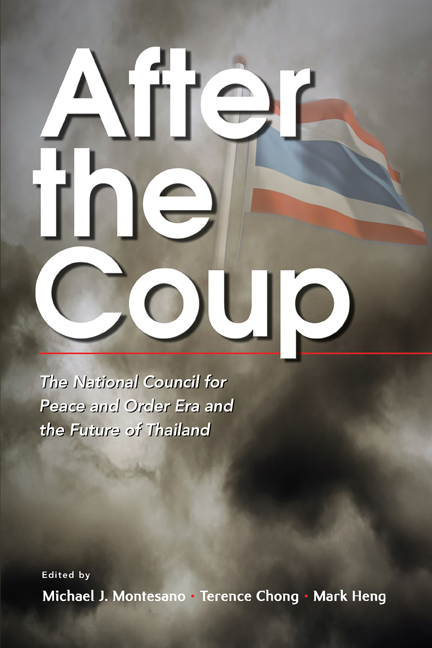Book contents
- Frontmatter
- Contents
- About the Contributors
- 1 Introduction: Thai Realities and Possibilities after the 22 May Coup
- 2 The Rise of the Thai Upper Middle Class and its Turn against Democracy
- 3 “We the Southerners Come to Protect the Nation and the King”: Southerners’ Political Rise and Regional Nationalism in Thailand
- 4 Exit, Voice, (Dis)loyalty? Northeast Thailand after the 2014 Coup
- 5 The Red Shirts and their Democratic Struggle in Northern Thailand, April 2010 – May 2015
- 6 The Shifting Battleground: Peace Dialogue in Thailand's Malay-Muslim South
- 7 Thailand's Zigzag Road to Democracy: Continuity and Change in Military Intervention
- 8 Murder and Regress: Violence and Political Change in Thailand
- 9 Thailand's Politics of Decentralization: Reform and Resistance before and after the May 2014 Coup
- 10 Change and Continuity in the Politics of the Media after the Coup
- 11 Thailand's Royal Democracy in Crisis
- 12 The Foreign Press and its Changing Perceptions of the Thai Monarchy
- 13 Thai Economic Growth: Retrospect and Prospect
- 14 Features and Challenges of an Ageing Population in Thailand
- 15 Conclusion: Thailand in Transition
- Bibliography
- Index
11 - Thailand's Royal Democracy in Crisis
Published online by Cambridge University Press: 23 May 2019
- Frontmatter
- Contents
- About the Contributors
- 1 Introduction: Thai Realities and Possibilities after the 22 May Coup
- 2 The Rise of the Thai Upper Middle Class and its Turn against Democracy
- 3 “We the Southerners Come to Protect the Nation and the King”: Southerners’ Political Rise and Regional Nationalism in Thailand
- 4 Exit, Voice, (Dis)loyalty? Northeast Thailand after the 2014 Coup
- 5 The Red Shirts and their Democratic Struggle in Northern Thailand, April 2010 – May 2015
- 6 The Shifting Battleground: Peace Dialogue in Thailand's Malay-Muslim South
- 7 Thailand's Zigzag Road to Democracy: Continuity and Change in Military Intervention
- 8 Murder and Regress: Violence and Political Change in Thailand
- 9 Thailand's Politics of Decentralization: Reform and Resistance before and after the May 2014 Coup
- 10 Change and Continuity in the Politics of the Media after the Coup
- 11 Thailand's Royal Democracy in Crisis
- 12 The Foreign Press and its Changing Perceptions of the Thai Monarchy
- 13 Thai Economic Growth: Retrospect and Prospect
- 14 Features and Challenges of an Ageing Population in Thailand
- 15 Conclusion: Thailand in Transition
- Bibliography
- Index
Summary
Observers typically use one of two conventional discourses of democratization to explain the May 2014 coup in Thailand. First is the “vicious cycle” discourse that posits a repeated cycle of military coups, followed by new constitutions, and then general elections. The elected government proceeds to fail, whether because of challenges from the communists, challenges to the monarchy, corruption scandals or a combination of these factors. This failure leads to yet another coup. This discourse was most prevalent between the 1950s and the 1980s, when coups were more frequent. From 1992 to 2006, when electoral democracy was more stable, another discourse — that of “linear progress” — became more popular. This discourse characterized Thailand's history of democratization as one of linear progression beginning from the end of the absolute monarchy in 1932, with milestones such as the 1973 popular uprising that ended twenty-three years of military rule and the 1992 uprising that seemed to put military rule to rest. However, the occurrence of two coups in less than ten years, in 2006 and 2014, undermined the second discourse and revived the idea of the vicious cycle as an explanation for the state of Thai democracy.
The two discourses have one thing in common: an understanding that democratization is the struggle against the military to entrench the supremacy of elections and civilian rule. This struggle is a common political experience for Thais, especially those born in the 1940s or somewhat later and coming of age in the late 1950s or the 1960s. Likewise, during the past fifty years, Thais have conventionally understood their monarchy as being “above” politics, always neutral in the ideological struggles and politicking between political parties and within the government.
By “monarchy”, I mean a social institution and entity that is active in cultural, social, economic and political life, like any other institution or entity. Duncan McCargo (2005) shows that the “royal institution”, as it is often called, is a network of non-monolithic groups and individuals whose interests rely on, and who derive legitimacy from, their varying associations with the king. This “network monarchy” is thus a larger entity than the king or even the palace. Nonetheless, as this chapter argues, the charismatic king himself was indispensable and indeed pivotal to the success or failure of this network monarchy.
- Type
- Chapter
- Information
- After the CoupThe National Council for Peace and Order Era and the Future of Thailand, pp. 282 - 307Publisher: ISEAS–Yusof Ishak InstitutePrint publication year: 2019

